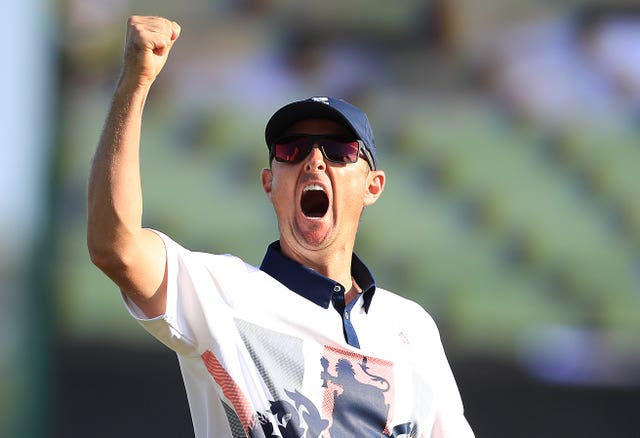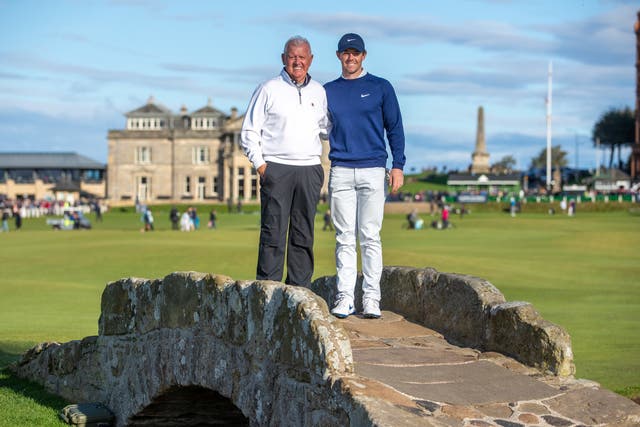As the European Tour season draws to a close in Dubai, PA golf correspondent Phil Casey sat down with chief executive Keith Pelley during the Turkish Airlines Open for a wide-ranging interview.
Here, Pelley discusses the state of the Tour, his feelings towards Rory McIlroy, the battle against slow play, dependence on the Ryder Cup and his own future, among other topics.
Q. 2019 was the first year of golf's new schedule, with the US PGA Championship's move to May having a knock-on effect. How did it pan out for the European Tour?
⛳ Minimum of 46 Race to Dubai events🗺️ 29 different countries⭐ 8 #RolexSeries events Our 2020 schedule has been announced. — The European Tour (@EuropeanTour) October 2, 2019
A. The schedule every single year, the complexity of the global schedule based on so many different tours, always makes it a jigsaw puzzle. We look at "heat moments" through the year where we think we can attract top player participation. This year the September date really worked well for the BMW PGA Championship as well as for the Alfred Dunhill which also had a terrific field.
There's no question that the one part of the business that keeps us up late at night and on which there is never a shortage of strong opinions, is the schedule. It's very, very difficult.
We've had some great support from the US players and one of the reasons they like to come over to Europe is the iconic cities. Tony (Finau) and his wife had a wonderful evening in London and you've got a world-class city with a world-class golf course that's 40 minutes away it's hard not to have a really good time. We play in places like Rome and Paris and that's one of the greatest advantages we have. We're in constant dialogue with all the top players, giving them an option of playing here and having a completely different experience and we'd love to have them.
Q. Have you tried to get Tiger Woods to play in a regular European Tour event?
A. I think everybody tries to get Tiger to play in every single event! We don't always get the answer we would like and we respect and understand it, but I think we all enquire.
Q. Is it just about money?
It looks like "The Match," featuring Tiger Woods and Phil Mickelson is returning. Turner has signed a three-year deal with the two golfer's joint business entity. 👀https://t.co/pPKCU3qmCo — Golf Digest (@GolfDigest) December 26, 2018
A. There's a plethora of reasons why players play tournaments; world ranking points, prize fund, ease of schedule, is it a golf course that they like, what are the amenities – the city, how they are treated – player appearance fees are another. There are so many different variables.
Tiger is a unique athlete who can choose to play anywhere he wants and if he decides that he wants to play in this particular area everyone welcomes him with open arms. And yes, there is an appearance fee for Tiger, but so there should be because he significantly changes the value of that tournament, from the hospitality, the tickets and the value of the sponsorship based on television distribution and ratings and engagement on the social front.
There are very few global athletes – Michael Jordan is the one that Tiger reminds me of having closely followed MJ's career – that can influence and change a sport like Tiger can and has.
Q. Are you happy with the changes to the 2020 schedule?
A. There will be more changes in 2021 than there were in 2020. With the Ryder Cup and the Olympics in 2020 and the condensed schedule in the US it made it challenging for us with the Dubai Duty Free Irish Open. We talked about whether we were going to do what we did in 2016 with the French Open – not sanctioning the WGC event which took place the same week – and we talked with the PGA Tour about co-sanctioning it where it would allow for Race to Dubai points and FedEx points (to be earned). We were probably too late getting to the table to make that happen.
Then we looked at the top players in terms of Rory (McIlroy), Shane (Lowry) and Jon Rahm and they felt that date (May 28-31) is good for them. Am I happy the way it worked out? We shall see. But 2020 for a consumer there is a lot of great golf tournaments going on.
The Olympics is a completely different event than it was four years ago. Justin Rose was announced on the first tee here as the Olympic champion because you're the Olympic champion for four years. Danny Willett and Patrick Reed weren't announced as the Masters champion. That Olympic medal, which is completely different from any other title, I think has been one of the biggest surprises for the players on how important that is from a prestige perspective and a monetary side. The Olympics becomes a can't-miss if you qualify.

The top players are playing a little less. In 2015 they played 24.7 times. In 2018 they played 22.3 times. Last year in the Bahamas, Justin (Rose) showed me his schedule and it was on three walls – it was incredibly complex and complicated but well thought out. They look at it forensically.
But in 2021 we are looking at some really interesting different changes to the schedule. Will we have three Rolex Series events in a row? Can you do one or two Rolex Series events with a very, very strong field during the condensed time of the WGCs and the majors in the US? Will they come back for one week? Should we look at flying them over here?
We are going to elevate the Rolex Series events with a little more consistency in terms of the amenities that we bring to it. In Italy some of the players said it was not up to the standard to what a Rolex event should be, but that comment means everything because there is a certain threshold that has been established.
Q. What is the future of the Turkish Airlines Open? There has been talk that the sponsors were questioning the value of their investment.
A. Right now we are having discussions with Turkish Airlines about exactly that. What is the future of the tournament? How can we make it better? Is this the right time of the year for it after the three weeks in Asia? Those are the questions but not about 2020, but beyond.
The next level for this tournament would be greater fan engagement and in order to do that Turkish players have to perform. They have to get into the Olympics or be able to perform and I say that with every (national) federation. Everyone wants to follow their players. If Bob MacIntyre continues to play like he is it will help golf in Scotland.
Q. You made a deal with Rory McIlroy in which he has to play three Rolex Series events a year rather than two extra tournaments for missing his home tournament (Irish Open). Are you bending the rules to benefit one player?
Thanks for a great week, @BMWPGA! Off to Scotland for some golf with my dad. pic.twitter.com/5KBRnTneI4 — Rory McIlroy (@McIlroyRory) September 23, 2019
A. Any time a top player like Rory can play in any tournament across the world, the tournament is immediately better. There's no question. My home country saw it this year when they embraced him in Canada. It was a Rory McIlroy fan club.
He not only brings fans but a lot of world ranking points. Similar to Tiger, he changes every tournament that he is in. So it behoves us to do as much as we possibly can to give a pathway for Rory to play. Every time Rory plays, we celebrate.
Having said that, the rule was not a fair rule and I also had the conversation with Henrik Stenson and Alex Noren, because if they don't play in Sweden they have to play six (tournaments to retain membership). However, you've got multiple choices to play if you're from the UK or even Germany. Why should Martin Kaymer have an advantage because his country has two or more tournaments? I was always troubled by the rule.
Q. A week later McIlroy said he was "honestly sick" of the easy course set-ups on the European Tour. Were you annoyed or upset by those comments?

A. One of the great attributes of Rory and one of the reasons he has that X-factor is that he is passionate and very intelligent and he says what's on his mind and what he thinks. We play on so many different courses and our set up is different every week so I wasn't upset about that.
They are independent contractors and you want them to have personalities, strong opinions. There have been comments from some of the US players that have been incredibly positive, whether it's Brooks Koepka or Billy Horschel, and then there's other comments that says 'we should be doing this.' It's the nature of it and I have a good relationship with all the players and I quite like them all so I wasn't phased by it.
Q. The LPGA is in talks with the Ladies European Tour (LET) over a partnership. Does the European Tour's offer of assistance to the LET still stand?
A. First and foremost our number one priority is for the LET to flourish. It's good for golf in Europe and anything that's good for golf is great for the European Tour. We've said this to the LET; we want to be involved and have tournaments with them, but we don't want to be the primary operator of ladies events. We can't be. Building tournaments is incredibly hard work and I'm not sure our members would want to embrace us taking on the risk and challenge of creating 25-30 LET events. We are 100 per cent supportive if the LPGA become involved and will still be involved with the LET and do events like we're doing with the Scandinavian Mixed.
Q. You were appointed in the summer of 2015. What does your own future hold?
A. I've enjoyed all aspects of it. Undeniably it is an incredible challenge based on the global golf infrastructure that is somewhat fractured. The whole landscape of sports is also changing.
My role is not done here yet. When I feel that I can no longer grow the tour, when I can no longer make a difference, I will step down, but I still feel we have a lot more to accomplish. I personally am not completely satisfied with where we are and remember the decision isn't just mine. As long as the players want me to be their chief executive, I have no plan on going anywhere in the short term.
Q. What is your biggest challenge?
A. Without a doubt it's the amount of time we spend on top player participation and the amount of conversation I have about it with sponsors, broadcast partners, the media.
Q. What has been your biggest success?
Hello South Africa 🇿🇦☀️ It's #NGC2019 week. #RolexSeries pic.twitter.com/tnR9CjTYtl — The European Tour (@EuropeanTour) November 12, 2019
A. The Rolex Series has been a game-changer for us. I'm also incredibly proud of the relationship we have with the players. There's 200-plus players and it's impossible to keep every single member happy but I think we have certainly created a players-first mentality.
We've also been incredibly innovative in everything from our social content to our willingness to try different formats, we've started to lead in terms of inclusivity with our commitment to golfers with a disability as well as bringing the ladies together with the men.
Q. The Tour's four-point plan to combat slow play begins in full next season. What else can be done?
A. The biggest challenge we have is the size of the arena – we play on 88 football fields – as well as the amount of competitors. Consumers want to watch what they want, when they want and we're all looking at how to shoot every player, every shot and distribute it across platforms. If you want to watch every single shot of Bradley Dredge, you can. Consumers, especially the younger generation, don't understand why you can't do that. Technology will lead us to that, then technology will lead us to slow play. The long-term answer is technology. The short-term answer is the four-point plan.
Q. How important is the Ryder Cup to the Tour's finances?
A. Since its inception the European Tour has worked on a four-year cycle. We lose, lose, lose, make money at the home Ryder Cup, balance your books. Going forward, this will be the very first cycle where we're not dependent on the Ryder Cup. It will help our books, but we are now at the ability where we can be profitable on an annual basis while still putting money back into tournaments and development.
Our sponsorship has doubled in the last four years in terms of actual revenue, our individual ownership of European Tour Productions – which will allow us to put about £45-50million into our business over the next four years – has given us options and the direction from the board now is that the Ryder Cup is critical and we're going to build it out under (Ryder Cup director) Guy Kinnings. But we don't believe it's good business practice for our business to be 100 per cent reliant on the Ryder Cup so we've moved away from that for the first time.






